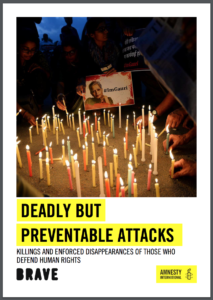A new report released by Amnesty International paints a grim picture of the situation for human rights defenders across the globe who face death, persecution and harassment for carrying out human rights work. The report raises particular concern for Dalit human rights defenders in India.
“In India, those advocating for the rights of ethnic and religious minorities and against caste-based discrimination are at ongoing risk of attack. The groups facing most abuses are Dalits (members of the lower castes) and Adivasis (members of Indigenous and tribal groups),” the report states.
The report, “Deadly but Preventable Attacks: Killings and Enforced Disappearances of Those who Defend Human Rights” includes testimonies from human rights defenders, as well as relatives and colleagues of human rights defenders who have been killed, and includes specific analysis of the situation faced by defenders in India.

The report furthermore outlines the underlying caste discrimination and human rights abuses in India, that make the difficult circumstances faced by Dalit human rights defenders in India all the more pertinent to address. It also gives a case example of a Dalit human rights defender from IDSN member organisation NCDHR/NDMJ, who was killed for carrying out his work.
”Dalit human rights defender Chandrakant Gaikwad, from Maharashtra state, was shot and killed reportedly by an individual against whom he had filed a complaint for committing crimes against Dalit people. Chandrakant Gaikwad was a volunteer with the National Dalit Movement for Justice and actively supported victims of caste-based discrimination in accessing justice by helping them file and follow up on complaints with local authorities. He had been threatened repeatedly. The alleged perpetrator had been arrested previously on charges of crimes against Dalits but had been released on bail. There has been no effective investigation into the killing,” the report states.
The shrinking space across caste-affected countries is extremely concerning and the report is yet another testament to this.
